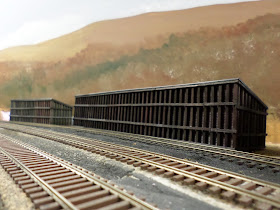 |
| These two sheds make up most of the Shepley Coal complex at Waterbury. |
 |
| View from the opposite end. Still need to stain the end wall! |
Since I need to be quiet for these morning work sessions I've chosen to finish up the coal dealer and freight house in Waterbury.
Photos show the current state of the Shepley Coal Company sheds. Though not as interesting as silo or elevated ramp style sheds, these lean-to sheds were perhaps the most common in New England in the 1940s and 50s.
Mine is made from Scribed basswood sheets with 6 x 6 posts glued along the side. The bracing crossmembers are 2 x 8s. Everything is stained with a combination of Hunterline Blue Gray, Creosote, and Light Brown stains. The roof is black .040" styrene - I'll add tissue to the roof to represent tarpaper.
Also, the rear walls of the two sheds face the backdrop, so these are also plain styrene. No reason to expend effort on something no one will ever be able to see.
You'll notice there is some pink foam crumbs visible where I carved away some scenery to make room for the sheds. I didn't vacuum it up before taking the pictures - need to be quiet, remember?
Finally - about the name - Shepley was the name of the company as seen on prototype Sanborn Maps. I didn't have room to model the sheds full size - but my sheds are plenty long. I have a small shack that will serve as a scale house that will be installed when I add the scenery texture to this scene. I'm not sure I'm going to call the industry Shepley. I might name it after a friend.



Nicely done.
ReplyDeleteThe coal sheds I am familiar with are COlorado NG. They have doors (drop down?) trackside for the coal to be hand shoveled out of the RR cars. I can't see if your sheds have a means for moving the coal from the cars. Customers accessed the coal from the non trackside. Just curious
ReplyDeleteBror Hultgren
Bror,
DeleteAware of what you're talking about with the low doors on the trackside, and I looked for some evidence of doors or openings and couldn't find any on these sheds. Years ago I did find some evidence of a drop pit (at the time I saw it the siding was gone and it was basically a concrete lined hole in the weeds!) between the two long sheds. The vast majority of retail coal in New England was delivered by conventional hoppers. The car would be unloaded into a pit between the rails and conveyors used to move the coal into place. Unless I can find evidence to the contrary, that's the arrangement I'm going to use here. Thanks for writing.
Marty
Looking forward to see what you dig up on that foundry, I won't build this until I can get more information. I too will build a compact version of those coal sheds. Thanks for those construction techniques. JOHN HAJNOSZ
ReplyDelete